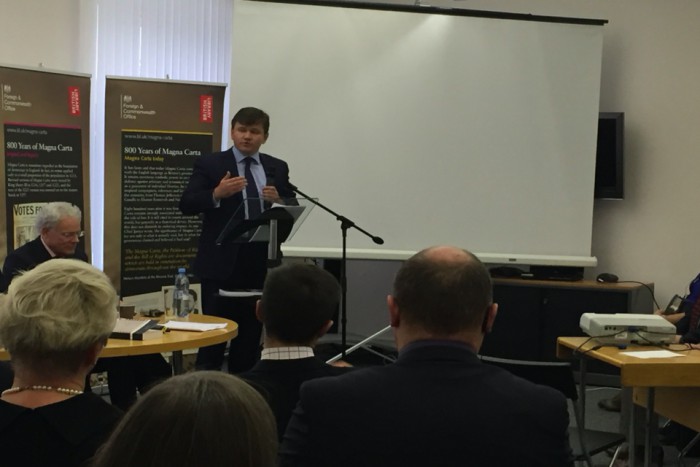21st October 2015
Magna Carta – a journey of 800 years
I was delighted to have been invited to participate in a seminar on the 800th Anniversary of the Magna Carta at the British Consulate General in St Petersburg on 13-14 October. It was an honour to join the distinguished British Professor David Carpenter to discuss the history of Magna Carta and its impact on legal and political developments in the UK and other countries, including Russia.
“Runnymede today is an atmospheric and evocative place. The great meadow stretches out beside the Thames, and one can easily imagine it filled with the pavilions of King John and the tents of the barons during those June days in 1215 when Magna Carta was being negotiated… The great jets taking off from London’s Heathrow Airport often come up over Runnymede, and then turn to fly down its whole length, slowly gaining height as they disappear into the distance. It is as though they are carrying the Charter to the four corners of the world”[1].
This journey was and still is about democracy, human rights, and rule of law. In particular, chapters 39 and 40 of Magna Carta, which form part of English law even today, prominently protect the right to liberty and personal security, property rights, and due process of law (if the matter is about deprivation or limitation of the former substantive rights). Ultimately, it is all about predictability and inviolability of people’s lives, versus arbitrariness: – it is about rule of law rather than rule by law.
The guarantees found in the Great Charter travelled all the way to New York landing in the texts of the Universal Declaration of Human Rights and the International Covenant on Civil and Political Rights, parts of which are often referred to as the International Bill of Rights, or International Magna Carta. They continue to set the standard for human rights protection in national constitutions.
The drafters of the 1993 Constitution of the Russian Federation drew inspiration from those international documents while writing chapters 1 and 2 – parts of the contemporary Russian Constitution which cannot be amended without changing the Constitution altogether. Therefore, they were supposed to form the bedrock of the contemporary Russian constitutional order.
The 1993 Russian Constitution specifies that human rights guarantees shall be interpreted in accordance with “the universally recognized principles and norms of international law” (section 17 § 1), which form an integral part of the Russian legal system (section 15 § 4).
These sections acquired new meaning in 1998 when the Russian Federation acceded to the European Convention on Human Rights which (inspired by Magna Carta) in its preamble refers to the rule of law, a provision famously interpreted by the European Court of Human Rights as implying right of access to court, a right not mentioned expressly in the text of the Convention. In 1975, in the British case, the Strasbourg Court was simple and bold enough to proclaim: “[O]ne can scarcely conceive of the rule of law without there being a possibility of having access to the courts”[2].
It is true that solemn constitutional formulae remain promises rather than reality. But that was also true of Magna Carta which for long periods of English history was “honoured only in the breach”[3]. A long journey started 800 years ago at Runnymede was not without periods of turbulence.
Of course, the limitations of Magna Carta should not be forgotten, in particular, its lack of protection of vulnerable groups, such as people with disabilities, who may need affirmative action in order to assert and exercise their rights meaningfully and effectively.
However, Magna Carta’s aspirations are still valid and relevant today, just as they were in 1215. Even more, in today’s globalized and increasingly unpredictable world, the urgent necessity of the Magna Carta of Nations should be seriously considered.
The late Lord Bingham once observed, referring to the speech given by Dame Rosalyn Higgins, that, in so far as international law is concerned, the absence of compulsory recourse to the International Court of Justice falls short of a recognisable rule of law model, and, therefore, that step must be taken if the international rule of law is to become truly effective[4]. Magna Carta still has the global part of its exciting journey to travel.
[1] David Carpenter, Magna Carta, Penguin Books, 2015, at vii.
[2] Golder v. United Kingdom, no. 4451/70, § 34 in fine, Series A, no. 18.
[3] Paul Harvey, Anthony Arlidge and Igor Judge, Magna Carta Uncovered, Hart Publishing, 2014, Book review, EHRLR, 2015, 3, at 327.
[4] Tom Bingham, The Rule of Law in International Legal Order, in The Rule of Law in International and Comparative Context (ed. R. McCorquodale), British Institute of International and Comparative Law, 2010, at 18.

